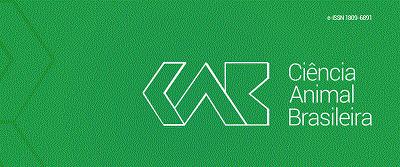Resumos
As alterações no hemograma estão direta ou indiretamente relacionadas com câncer e são pouco descritas em cadelas com neoplasia mamária. O objetivo deste estudo foi analisar as alterações hematológicas em 161 cadelas portadoras de neoplasia mamária e correlacionar à progressão da doença. As principais alterações hematológicas encontradas foram anemia normocítica e normocrômica e leucocitose neutrofílica, sendo ambas mais frequentes em cadelas em estádio avançado (III, IV ou V) da doença. Conclui-se que as alterações laboratoriais de anemia e leucocitose verificadas em cadelas com neoplasia mamária estão correlacionadas positivamente com o estádio avançado da doença.
anemia; estadiamento; leucocitose
Complete blood cell (CBC) changes are directly or indirectly related to cancer and have not been reported in bitches with mammary tumors. The aim of this study was to evaluate CBC changes in 161 bitches with mammary tumors, and to correlate them with disease progression. Normocytic and normochromic anemia and neutrophilic leukocytosis were observed and correlated with disease stages III, IV and V. In conclusion, anemia and leukocytosis may be correlated with advanced stages of mammary tumors in bitches.
anemia; leukocytosis; staging
-
1De Nardi AB, Rodaski S, Sousa RS, Costa TA, Macedo TR, Rodigheri SM, Rios A, Piekarz CH. Prevalência de neoplasias e modalidades de tratamento em cães atendidos no Hospital Veterinário da Universidade Federal do Paraná. Archives of Veterinary Science. 2002; 7(2):15-26.
-
2Sorenmo K. Canine mammary gland tumors. Veterinary Clinics of North America: Small Animal Practice. 2003;33:573-596.
-
3Lana SE, Rutteman GR, Withrow SJ. Tumors of the mammary gland. In: Withrow SJ, Vail DM. Small Animal Clinical Oncology. 4th ed. St Louis: Saunders Elsevier; 2007. p. 619-636. English.
-
4De Nardi AB, Rodaski S, Rocha NS, Fernandes SC. Neoplasias mamárias. In: Daleck CR, De Nardi AB, Rodaski S. Oncologia em cães e gatos. São Paulo: Roca; 2009. p. 372-383. Portuguese.
-
5Sorenmo KU, Rasotto R, Zappulli V, Goldschmidt MH. Development, anatomy, histology, lynfatic drainage, clinical features, and cell differentiation markers of canine mammary gland neoplasm. Veterinary Pathology. 2011; 48(1):85-97.
-
6Childress MO. Hematologic Abnormalities in the Small Animal Cancer Patient. Veterinary Clinics of North America: Small Animal Practice. 2012; 42(1):123-155.
-
7Dietl B, Marienhagen J, Schäfe C, Kölbl O. The Prognostic Value of Anaemia at Different Treatment Times in Patients with Locally Advanced Head and Neck Cancer Treated with Surgery and Postoperative Radiotherapy. Clinical Oncology 2007; 19(4):228-233.
-
8Connolly GC, Khorana AA, Kuderer NM, Culakova E, Francis CW, Lyman GH. Leukocytosis, thrombosis and early mortality in cancer patients initiating chemotherapy. Thrombosis Research. 2010; 126(2):113-118.
-
9Stockham SL, Scott MA.Fundamentals of Veterinary Clinical Pathology. 2nd ed. Iowa: Wiley-Blackwell; 2008. 936p. English.
-
10Feldman BF, Zinkl JG, Jain CN. Schalm´s Veterinary Hematology. 5th ed. Philadelphia: Lippincott Williams & Wilkins. 2000.1344p. English.
-
11Hodges J, Christopher MM. Diagnostic accuracy of using erythrocyte indices and polychromasia to identify regenerative anemia in dogs. Journal of the American Veterinary Medical Association. 2011; 238(11):1452-1458.
-
12Meuten DJ. Tumors in domestic animals. 4th ed. Iowa: Wiley-Blackwell; 2002. 788p. English.
-
13Dunst J, Kuhnt T, Strauss HG, Krause U, Pelz T, Koelbl H, Haensgen G. Anemia in cervical cancers: impact on survival, patterns of relapse, and association with hypoxia and angiogenesis. International Journal of Radiation Oncology Biology Physics. 2003; 56(3):778-787.
-
14Miller AG, Morley PS, Rao S, Avery AC, Lana SE, Olver CS. Anemia is associated with decreased survival time in dogs with lymphoma. Journal of Veterinary Internal Medicine. 2009; 23:116-122.
-
15Kirshner J, Hatch M, Hennessy DD, Fridman M, Tannous RE. Anemia in stage II and III breast cancer patients treated with adjuvant doxorubicin and cyclophosphamide chemotherapy. Oncologist. 2004; 9(1):25-32.
-
16Leonard RC, Untch M, Von Koch F. Management of anaemia in patients with breast cancer: role of epoetin. Annals of Oncology. 2005; 16(5):817-824.
-
17Takahashi T, Kadosawa T, Nagase M, Matsunaga S, Mochizuki M, Nishimura R, Sasaki N. Visceral mast cell tumors in dogs: 10 cases (1982-1997).Journal of the American Veterinary Medical Association. 2000; 216(2):222-226.
-
18Endicott MM, Charney SC, Mcknight JA, Loar AS, Barger AM, Bergman PJ. Clinicopathological findings and results of bone marrow aspiration in dogs with cutaneous mast cell tumours: 157 cases (1999-2002). Veterinary Comparative Oncology. 2007; 5(1):31-37.
-
19Oyama, MA, Rush JE, O´Sullivan ML, Williams RM, Rozanski EA, Petrie J, Sleeper MM, Brown DC. Perceptions and priorities of owners of dogs with heart disease regarding quality versus quantity of life for their pets. Journal of the American Veterinary Medical Association. 2008; 233(1):104-108.
-
20Oliveira Filho JC, Kommers GD, Masuda EK, Marques BMFPP, Fighera RA, Irigoyen LF, Barros CSL. Estudo retrospectivo de 1.647 tumores mamários em cães. Pesquisa Veterinária Brasileira. 2010; 30(2):177-185.
-
21Ribas CR, Dornbusch PT, De Faria MR, Wouk AFPF, Cirio SM. Alterações clínicas relevantes em cadelas com neoplasias mamárias estadiadas. Archives of Veterinary Science.2012; 17(1):60-68.
-
22Sorenmo MU, Kristiansen VM, Cofone MA, Shofer FS, Breen AM, Langeland M, Mongil CM, Grondahl AM, Teige J, Goldschmidt MH. Canine mammary gland tumours; a histological continuum from benign to malignant; clinical and histopathological evidence. Veterinary Comparative Oncology. 2009; 7(3):162-172.
Datas de Publicação
-
Publicação nesta coleção
14 Abr 2014 -
Data do Fascículo
Mar 2014
Histórico
-
Aceito
08 Out 2013 -
Recebido
16 Set 2009

